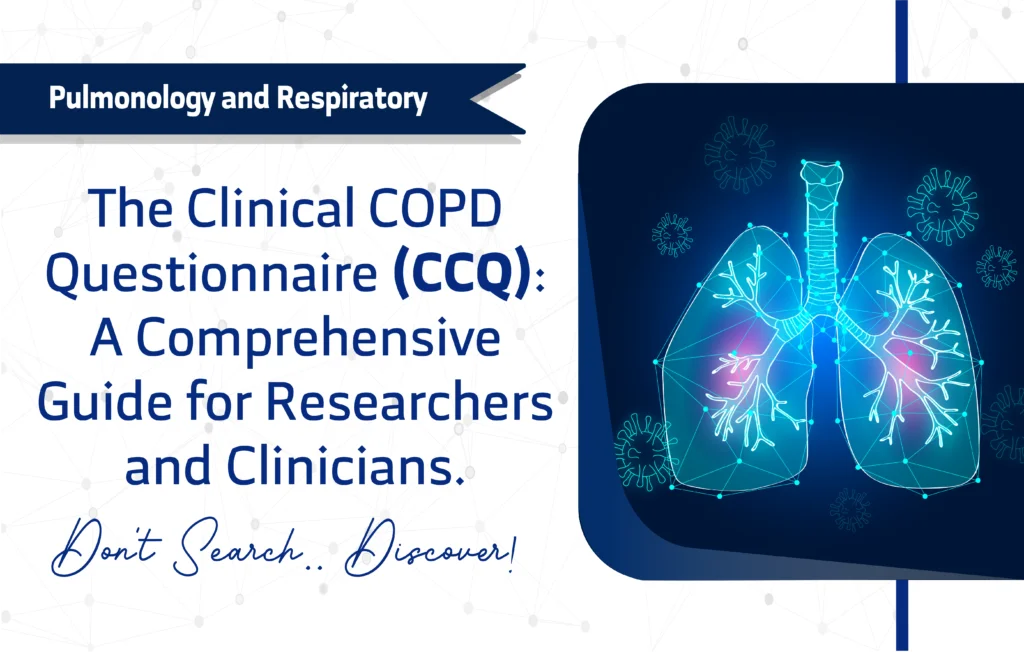Introduction
Chronic Obstructive Pulmonary Disease (COPD) is a progressive lung disease that affects millions of people worldwide. Researchers and clinicians are continuously exploring effective ways to assess the quality of life and health status of COPD patients. The Clinical COPD Questionnaire (CCQ) is a well-established, reliable, and practical tool for evaluating the symptoms, functional limitations, and mental well-being of patients with COPD.
This article provides an in-depth overview of the CCQ, its purpose, reliability, and practical applications in both clinical and research settings. Whether you are a researcher or clinician, understanding the CCQ can significantly enhance your ability to evaluate and monitor patients’ health outcomes.
Key Features of the Clinical COPD Questionnaire
Purpose and Use
The primary objective of the CCQ is to assess the health status and quality of life in patients with COPD. It focuses on symptoms, functional limitations, and mental state related to the disease, helping healthcare professionals evaluate the patient’s overall well-being and guide treatment decisions.
Target Population
The CCQ is designed for adults aged 18 and older, including both middle-aged and older adults. It is particularly valuable for monitoring COPD patients’ health, assessing treatment progress, and evaluating the impact of interventions over time.
Structure
The CCQ contains 10 items that cover the following domains:
- Health Status: The overall physical condition and symptoms of the patient.
- Quality of Life: The extent to which COPD affects the patient’s daily functioning and emotional well-being.
- Sub-domains:
- Symptoms: Shortness of breath and other physical signs.
- Functional State: Limitations in daily activities caused by COPD.
- Mental State: Psychological aspects, such as feelings of concern and emotional distress.
Scoring Method
The CCQ uses a Likert scale, ranging from 0 to 6. This scale evaluates the severity of symptoms, with 0 indicating “asymptomatic/no limitation” and 6 indicating “extremely symptomatic/totally limited.” This approach allows clinicians to measure changes in the patient’s condition over time.
Administration Format
The questionnaire can be administered through various formats, including:
- Digital (online platforms)
- Mobile applications
- In-person interviews
- Phone or video calls
This flexibility ensures that it can be integrated into diverse clinical settings, making it accessible for both remote and in-person evaluations.
The AQLQ questionnaire is a self-administered instrument, eliminating the need for formal training. It is available under a proprietary license, limiting its use and distribution to authorized entities.
Applications of the Clinical COPD Questionnaire
The CCQ is primarily used for:
- Screening: Identifying patients who may need further clinical attention.
- Monitoring: Tracking changes in the patient’s condition over time, particularly after interventions or treatment.
- Treatment Planning: Aiding in the formulation of tailored care plans based on the patient’s current health status.
- Research: Assisting researchers in collecting standardized data for COPD-related studies.
Languages Available
The CCQ is available in multiple languages, including English, Spanish, French, German, Portuguese, and Japanese, among others. This wide availability enhances its usability across different regions and populations.
Reliability and Validity
The CCQ has been extensively validated, demonstrating high reliability and validity across different populations. Cronbach’s alpha for internal consistency is used to ensure that the tool provides consistent and accurate results. It has been cited in over 1000 studies, confirming its robustness and clinical utility.
Limitations and Considerations
While the CCQ is a reliable and versatile tool, it does have some limitations:
- Self-report Measure: The CCQ relies on patients’ self-reported data, which may be subject to biases or inaccuracies.
- Cultural Bias: The questionnaire may not be equally applicable across all cultural contexts, and its interpretation may vary based on cultural norms.
- Language Barriers: Although available in multiple languages, some regional dialects or languages may not be fully covered, limiting its global applicability in certain populations.
Despite these limitations, the CCQ remains a valuable resource for assessing COPD patients, particularly when used alongside other diagnostic tools and clinical assessments.
Additional Information
Frequently Asked Questions (FAQ)
- How long does it take to complete the CCQ?
The CCQ takes approximately 5 minutes to complete, making it an efficient tool for both clinical and research settings. - Is the CCQ available for free?
Yes, the CCQ is free to use, with no licensing or payment required. - What is the scoring system for the CCQ?
The CCQ uses a Likert scale from 0 to 6, where 0 indicates no symptoms or limitations, and 6 indicates extreme symptoms and limitations. - Who developed the CCQ?
The Clinical COPD Questionnaire was developed by van der Molen T
A word from ResRef about Clinical COPD Questionnaire (CCQ)
The CCQ is a reliable and practical tool for assessing health-related quality of life in COPD patients. The Global Initiative for Chronic Obstructive Lung Disease (GOLD) guidelines recommend its use for evaluating COPD patients It provides valuable insights into the severity of symptoms, functional limitations, and mental well-being, helping clinicians and researchers monitor patients’ progress and improve treatment outcomes.
References
- van der Molen, T., Willemse, B.W., Schokker, S. et al. Development, validity and responsiveness of the Clinical COPD Questionnaire. Health Qual Life Outcomes 1, 13 (2003). https://doi.org/10.1186/1477-7525-1-13. Study link









1 thought on “The Clinical COPD Questionnaire (CCQ): A Comprehensive Guide for Researchers and Clinicians.”
Thanks for sharing. I read many of your blog posts, cool, your blog is very good.